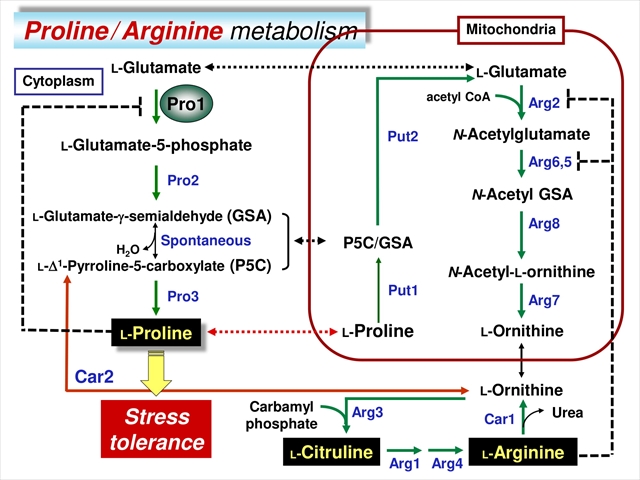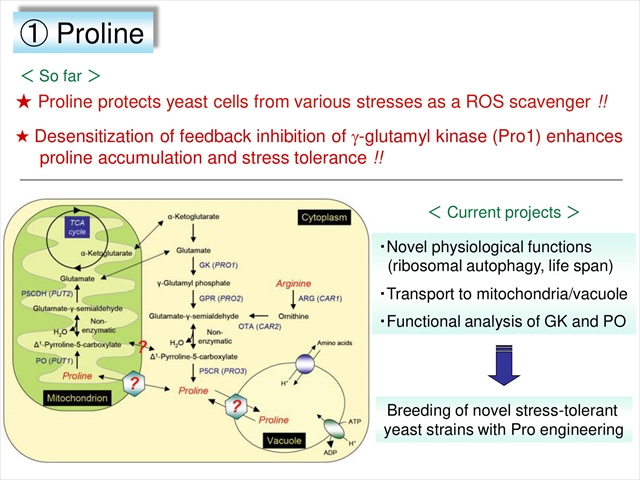Research Projects
1. Novel stress-tolerant mechanisms of yeast cells and their applications for breeding of industrial yeast
1) Proline: Metabolic regulation and physiological functions
In response to osmotic stress, proline (Pro) is accumulated in many bacterial and plant cells as an osmoprotectant. During various stresses, however, yeast cells induce glycerol or trehalose synthesis, but do not increase the Pro level. Pro is reported to have the in vitro multiple functions, such as protein/membrane stabilization and hydroxy radical scavenging, but the in vivo mechanism is poorly understood. We found that Pro is a very good cryoprotectant to yeast cells. Probably due to the extremely high water solubility, Pro may inhibit dehydration or ice crystal formation during freezing stress. Yeast cells synthesize Pro from glutamate (Glu) and also convert Pro into Glu in mitochondria. We successfully constructed yeast cells that accumulate Pro by disrupting the Pro oxidase (PO) gene and by expressing the feedback inhibition-insensitive γ-glutamyl kinase (GK) variants. So far, we engineered laboratory and industrial yeast strains that accumulate Pro and found that Pro protects yeast cells from various stresses as a ROS scavenger, but its cellular level and localization are very important for the stress-protective effect. We currently study the physiological functions of Pro, such as ribophagy and lifespan, and the functions of key enzymes, such as GK and PO.


- A. Nishimura, Y. Yoshikawa, K. Ichikawa, T. Takemoto, R. Tanahashi and H. Takagi: Longevity regulation by proline oxidation in yeast. Microorganisms, 9(8), 1650 (2021).
- A. Nishimura, R. Tanahashi and H. Takagi: The yeast α-arrestin Art3 is a key regulator for arginine-induced endocytosis of the high-affinity proline transporter Put4. Biochem. Biophys. Res. Commun., 531, 416-421 (2020).
- N. Murakami, A. Kotaka, S. Isogai, K. Ashida, A. Nishimura, K. Matsumura, Y. Hata, H. Ishida and H. Takagi: Effects of a novel variant of the yeast γ-glutamyl kinase Pro1 on its enzymatic activity and sake brewing. J. Ind. Microbiol. Biotechnol., 47, 715-723 (2020). DOI: 10.1007/s10295-020-02297-1
- A. Nishimura, T. Tanikawa and H. Takagi: Inhibitory effect of arginine on proline utilization in Saccharomyces cerevisiae. Yeast, 37, 531-540 (2020). DOI: 10.1002/yea.3504
- Y. Mukai, Y. Kamei, X. Liu, S. Jiang, Y. Sugimoto, N. S. M. Nanyan, D. Watanabe, H. Takagi: Proline metabolism regulates replicative lifespan in the yeast Saccharomyces cerevisiae. Microbial Cell, 6, 482-490 (2019).
- A. Tsolmonbaatar, K. Hashida, Y. Sugimoto, D. Watanabe, S. Furukawa and H. Takagi: Isolation of baker’s yeast mutants with proline accumulation that showed enhanced tolerance to baking-associated stresses. Int. J. Food Microbiol., 238, 233-240 (2016).
- I. Nishida, D. Watanabe and H. Takagi: Putative mitochondrial α-ketoglutarate-dependent dioxygenase Fmp12 controls utilization of proline as an energy source in Saccharomyces cerevisiae. Microbial Cell, 3, 391-397 (2016).
- Y. Tatehashi, D. Watanabe and H. Takagi: g-Glutamyl kinase is involved in selective autophagy of ribosomes in Saccharomyces cerevisiae. FEBS Lett., 590, 2906-2914 (2016).
- I. Nishida*, D. Watanabe*, A. Tsolmonbaatar, T. Kaino, I. Ohtsu and H. Takagi: Vacuolar amino acid transporters upregulated by exogenous proline and involved in cellular localization of proline in Saccharomyces cerevisiae. *These authors contributed equally to this work. J. Gen. Appl. Microbiol., 62, 132-139 (2016).
- H. Takagi, J. Taguchi and T. Kaino: Proline accumulation protects Saccharomyces cerevisiae cells in the stationary phase from ethanol stress by reducing reactive oxygen species levels. Yeast, 33, 355-363 (2016).
- D. Greetham, H. Takagi and T. P. Phister: Presence of proline has a protective effect on weak acid stressed Saccharomyces cerevisiae. Anton. Leeuw. Int. J. G., 105, 641-652 (2014).
- Y. Tatehashi and H. Takagi: Characterization of g-glutamyl kinase mutants from Saccharomyces cerevisiae. J. Biosci. Bioeng, 116, 576-579, 2013.
- Y. Sasano, Y. Haitani, K. Hashida, I. Ohtsu, J. Shima and H. Takagi: Simultaneous accumulation of proline and trehalose in industrial baker’s yeast enhances fermentation ability in frozen dough. *These authors contributed equally to this work. J. Biosci. Bioeng., 113, 592-595 (2012).
- T. Kaino, Y. Tasaka, Y. Tatehashi and H. Takagi: Functional analysis of the C-terminal region of γ-glutamyl kinase from Saccharomyces cerevisiae. Biosci. Biotech. Biochem., 76, 454-461 (2012).
- Y. Sasano, Y. Haitani, I. Ohtsu, J. Shima and H. Takagi: Proline accumulation in baker’s yeast enhances high-sucrose stress tolerance and fermentation ability in sweet dough. Int. J. Food Microbiol., 152, 40-43 (2012).
- T. Kaino and H. Takagi: Proline as a stress protectant in the yeast Saccharomyces cerevisiae. Biosci. Biotech. Biochem., 73, 2131-2135 (2009).
- H. Takagi: Proline as a stress protectant in yeast: physiological functions, metabolic regulations and biotechnological applications. Appl. Microbiol. Biotech., 81, 211-223 (2008).
- T. Kaino, T. Tateiwa, S. Mizukami-Murata, J. Shima and H. Takagi: Self-cloning baker’s yeasts that accumulate proline enhance freeze tolerance in doughs. Appl. Environ. Microbiol., 74, 5845-5849 (2008).
- T. Kaino and H. Takagi: Gene expression profiles and intracellular contents of stress protectants in Saccharomyces cerevisiae under ethanol and sorbitol stresses. Appl. Microbiol. Biotech., 79, 273-283 (2008).
- T. Sekine, A. Kawaguchi, Y. Hamano and H. Takagi: Desensitization of feedback inhibition of the Saccharomyces cerevisiae γ-glutamyl kinase enhances proline accumulation and freezing tolerance. Appl. Environ. Microbiol., 73, 4011-4019 (2007).
- H. Takagi, F. Matsui, A. Kawaguchi, H. Wu, H. Shimoi and Y. Kubo: Construction and analysis of self-cloning sake yeasts that accumulate proline. J. Biosci. Bioeng., 103, 377-380 (2007).
- H. Takagi, M. Takaoka, A. Kawaguchi and Y. Kubo: Effect of L-proline on sake brewing and ethanol stress in Saccharomyces cerevisiae. Appl. Environ. Microbiol., 71, 8656-8662 (2005).
- K. Matsuura and H. Takagi: Vacuolar functions are involved in stress-protective effect of intracellular proline on Saccharomyces cerevisiae. J. Biosci. Bioeng., 100, 538-544 (2005).
- Y. Terao, S. Nakamori and H. Takagi: Gene dosage effect of L-proline biosynthetic enzymes on L-proline accumulation and freeze tolerance in Saccharomyces cerevisiae. Appl. Environ. Microbiol., 69, 6527-6532 (2003).
- Y. Morita, S. Nakamori and H. Takagi: L-Proline accumulation and freeze tolerance in Saccharomyces cerevisiae are caused by a mutation in the PRO1 gene encoding γ-glutamyl kinase. Appl. Environ. Microbiol., 69, 212-219 (2003).
- Y. Morita, S. Nakamori and H. Takagi: Effect of proline and arginine metabolism on freezing stress of Saccharomyces cerevisiae. J. Biosci. Bioeng., 94, 390-394 (2002).
- H. Takagi, K. Sakai, K. Morida and S. Nakamori: Proline accumulation by mutation or disruption of the proline oxidase gene improves resistance to freezing and desiccation stresses in Saccharomyces cerevisiae. FEMS Microbiol. Lett., 184, 103-108 (2000).
- H. Takagi, F. Iwamoto and S. Nakamori: Isolation of freeze-tolerant laboratory strain of Saccharomyces cerevisiae from proline-analogue-resistant mutants. Appl. Microbiol. Biotechnol., 47, 405- 411 (1997).
